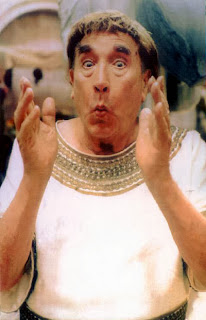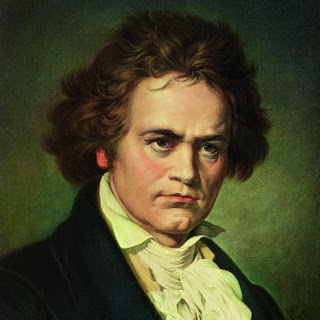Part II Since the objects of imitation are men in action, and these men must be either of a higher or a lower type (for moral character mainly answers to these divisions, goodness and badness being the distinguishing marks of moral differences), it follows that we must represent men either as better than in real life, or as worse, or as they are. It is the same in painting. Polygnotus depicted men as nobler than they are, Pauson as less noble, Dionysius drew them true to life.
Hack, hack, hack. I'll take his word for the three artists mentioned.
Now it is evident that each of the modes of imitation above mentioned will exhibit these differences, and become a distinct kind in imitating objects that are thus distinct. Such diversities may be found even in dancing, flute-playing, and lyre-playing. So again in language, whether prose or verse unaccompanied by music. Homer, for example, makes men better than they are; Cleophon as they are; Hegemon the Thasian, the inventor of parodies, and Nicochares, the author of the Deiliad, worse than they are. The same thing holds good of Dithyrambs and Nomes; here too one may portray different types, as Timotheus and Philoxenus differed in representing their Cyclopes. The same distinction marks off Tragedy from Comedy; for Comedy aims at representing men as worse, Tragedy as better than in actual life.
Finally: he talks about the content of comedy and tragedy. I am not entirely sure that the 'better' idea stands up: most of the characters in tragedy reach levels of naughtiness rarely attained in real life. The worst that the average ned can do is twock a car and burn it out in the woods. Oedipus does some incest, Medea kills all her kids, Orestes knacks his mother (who did his dad...). These actions are not impossible but they are outstanding.
He also needs comedy as an opposite: the idea that tragic heroes are better than real life depends on sitting them next to comic heroes. He must mean 'more grand' for 'better,' which I can accept. Larger than life, symbolic representatives of a type: although I am not sure that Euripides or Sophocles was interested in this... in fact, I like Sophocles for his psychological realism.
Furthermore, he is looking at representation rather than content. And character, which I believe is less important than plot...
Part III
There is still a third difference- the manner in which each of these objects may be imitated. For the medium being the same, and the objects the same, the poet may imitate by narration- in which case he can either take another personality as Homer does, or speak in his own person, unchanged- or he may present all his characters as living and moving before us.
These, then, as we said at the beginning, are the three differences which distinguish artistic imitation- the medium, the objects, and the manner. So that from one point of view, Sophocles is an imitator of the same kind as Homer- for both imitate higher types of character; from another point of view, of the same kind as Aristophanes- for both imitate persons acting and doing.
That was my problem with the earlier assertion, too, honest. The content of tragedy is no different to Epic poetry.
Hence, some say, the name of 'drama' is given to such poems, as representing action. For the same reason the Dorians claim the invention both of Tragedy and Comedy. The claim to Comedy is put forward by the Megarians- not only by those of Greece proper, who allege that it originated under their democracy, but also by the Megarians of Sicily, for the poet Epicharmus, who is much earlier than Chionides and Magnes, belonged to that country. Tragedy too is claimed by certain Dorians of the Peloponnese. In each case they appeal to the evidence of language. The outlying villages, they say, are by them called komai, by the Athenians demoi: and they assume that comedians were so named not from komazein, 'to revel,' but because they wandered from village to village (kata komas), being excluded contemptuously from the city. They add also that the Dorian word for 'doing' is dran, and the Athenian, prattein.
Frankly, I do not care at all who invented it: the only interesting thing is that Aristotle doesn't know, and this is a few years - maybe a century or so - after the scene blew up. Already lost in the mists of time. And etymology - the research of the autodidact, who never recognises that language shifts meanings according to use. Malcolm X was into etymology, and that was the least impressive part of his autobiography.
This may suffice as to the number and nature of the various modes of imitation.
Part IV
Poetry in general seems to have sprung from two causes, each of them lying deep in our nature. First, the instinct of imitation is implanted in man from childhood, one difference between him and other animals being that he is the most imitative of living creatures, and through imitation learns his earliest lessons; and no less universal is the pleasure felt in things imitated.
Is mimesis rooted in our nature - childhood play suggesting the high arts in embryo? And we learn through copying. This could make a strong defence for theatre as a moral force, against Plato's objections (and I am reading this as a response to Plato's anti-drama sentiments).
We have evidence of this in the facts of experience. Objects which in themselves we view with pain, we delight to contemplate when reproduced with minute fidelity: such as the forms of the most ignoble animals and of dead bodies.
Wait a minute - isn't David Cameron trying to ban that sort of mimesis?
The cause of this again is, that to learn gives the liveliest pleasure, not only to philosophers but to men in general; whose capacity, however, of learning is more limited. Thus the reason why men enjoy seeing a likeness is, that in contemplating it they find themselves learning or inferring, and saying perhaps, 'Ah, that is he.' For if you happen not to have seen the original, the pleasure will be due not to the imitation as such, but to the execution, the colouring, or some such other cause.
Pleasure is caused by the exercise of critical faculties: a chance to be judgemental.
Imitation, then, is one instinct of our nature. Next, there is the instinct for 'harmony' and rhythm, meters being manifestly sections of rhythm. Persons, therefore, starting with this natural gift developed by degrees their special aptitudes, till their rude improvisations gave birth to Poetry.
We like things to be harmonic - to resolve. That doesn't explain why I went to that Mainliner gig last night: it didn't so much resolve as repeat the heaviest riffs again and again. And Lea Cumming's set: it resolved into shouting. I don't think Aristotle would like Noise Poetry.
Poetry now diverged in two directions, according to the individual character of the writers. The graver spirits imitated noble actions, and the actions of good men. The more trivial sort imitated the actions of meaner persons, at first composing satires, as the former did hymns to the gods and the praises of famous men. A poem of the satirical kind cannot indeed be put down to any author earlier than Homer; though many such writers probably there were. But from Homer onward, instances can be cited- his own Margites, for example, and other similar compositions. The appropriate meter was also here introduced; hence the measure is still called the iambic or lampooning measure, being that in which people lampooned one another. Thus the older poets were distinguished as writers of heroic or of lampooning verse.
An association of certain poetic styles with the nature of the content: this might reveal how little material Aristotle had to consider. The association of content with form is intriguing
As, in the serious style, Homer is pre-eminent among poets, for he alone combined dramatic form with excellence of imitation so he too first laid down the main lines of comedy, by dramatizing the ludicrous instead of writing personal satire. His Margites bears the same relation to comedy that the Iliad and Odyssey do to tragedy. But when Tragedy and Comedy came to light, the two classes of poets still followed their natural bent: the lampooners became writers of Comedy, and the Epic poets were succeeded by Tragedians, since the drama was a larger and higher form of art.
Again, the line from Epic to Tragedy, the close association of the two forms of poetry... tragedy is an evolution of the epic poem because of the content. Now, I thought that the first plays emerged from dithyrambs, or hymns. I know they had the same content, even intent as epic (big subject, religious awe) but they were about the performance...
Yes, I know Homer is part of an oral tradition, but the oral tradition was just a guy telling a story. A dithramb needed to be composed, to have a tune, and maybe choreography. They don't come from a literary, or 'verbal' tradition.
Whether Tragedy has as yet perfected its proper types or not; and whether it is to be judged in itself, or in relation also to the audience- this raises another question. Be that as it may, Tragedy- as also Comedy- was at first mere improvisation. The one originated with the authors of the Dithyramb, the other with those of the phallic songs, which are still in use in many of our cities. Tragedy advanced by slow degrees; each new element that showed itself was in turn developed. Having passed through many changes, it found its natural form, and there it stopped.
Ah, the optimism of the philosopher: Tragedy has found its natural form, and the rest of history will involve variations on a theme. Riiiiight.
Aeschylus first introduced a second actor; he diminished the importance of the Chorus, and assigned the leading part to the dialogue. Sophocles raised the number of actors to three, and added scene-painting. Moreover, it was not till late that the short plot was discarded for one of greater compass, and the grotesque diction of the earlier satyric form for the stately manner of Tragedy. The iambic measure then replaced the trochaic tetrameter, which was originally employed when the poetry was of the satyric order, and had greater with dancing.
Once dialogue had come in, Nature herself discovered the appropriate measure. For the iambic is, of all measures, the most colloquial we see it in the fact that conversational speech runs into iambic lines more frequently than into any other kind of verse; rarely into hexameters, and only when we drop the colloquial intonation. The additions to the number of 'episodes' or acts, and the other accessories of which tradition tells, must be taken as already described; for to discuss them in detail would, doubtless, be a large undertaking.



.jpg)





.jpg)










